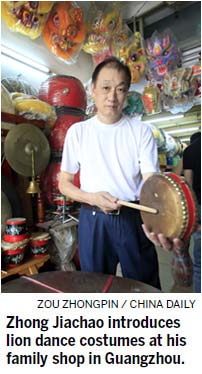Where there are Chinese there are always lion dance costumes
Updated: 2012-08-08 14:24
By Li Wenfang in Guangzhou (China Daily)
|
|||||||||||

As a fifth-generation lion dance costume maker, Zhong Jiachao, 64, has been through the many ups and downs of the business.
"Our industry is closely related to the economy and government policies," says Zhong. "I've been through the hard times, during the war and revolution. But now, the quality of life generally has improved. There are so many festivals, celebrations and sports events, which need our products. It's the best time of my career."
Zhong's family is one of the best-known lion dance costume makers in Guangdong's provincial capital Guangzhou. They delivered more than 1,800 sets of lion, dragon, qilin and pixiu costumes last year. Both qilin, a mythical Chinese animal much like a unicorn; and pixiu, a Chinese mythical hybrid creature of dragon, dog and lion; are also auspicious creatures in Chinese culture.
When Zhong's ancestors started the business in Dongguan, Guangdong, during the reign of Emperor Daoguang (1820-1849) in the Qing Dynasty, peak seasons came only before major festivals, like the Spring Festival, Mid-Autumn Festival and Dragon Boat Festival. During non-peak seasons, Zhong says, his ancestors operated a ferry to make ends meet.
Zhong's father opened a lion dance costume store on Daxin Road in Guangzhou in the 1930s, the most prosperous years for the trade, where more than 40 stores of its kind lined the road.
Business went downhill after the city fell to the Japanese troops in 1938, followed by the War of Liberation (1946-49).
Zhong started getting involved in the business in 1958, when all the lion dance costume stores on Daxin Road were combined into one. Soon after, he experienced the worst years of his business during the "cultural revolution" (1966-76).
The reform and opening-up of the country brought vitality back to the trade, he says.
The lion and dragon costumes his family made were used for major events like the return of Hong Kong and Macao to China, the Beijing Olympics in 2008 and the 2010 Asian Games in Guangzhou. "Our lion and dragon costumes were also used at the launch ceremonies of major casinos in Macao. They were also worn by Jackie Chan in his movies," Zhong says with pride.
He was always on site to supervise the product quality and to instruct the dancers.
The making of lion dance costumes in Guangzhou was included in the provincial intangible cultural heritage list in 2009. The local government also offers tax incentives to Zhong's shop for its unique craftsmanship.
"I feel obliged to carry on this craft. Otherwise my 50 years in this trade will go to waste," Zhong says at his four-story traditional Cantonese arcade-shophouse on Daxin Road. There are now less than 10 lion-dancing shops on the same street.
To make a lion head, Zhong first shapes the frame with bamboo strips. He then covers the skeleton with paper and paints on it. Zhong says although it is not a very difficult craft to learn, apprentices need at least a year to master the craft.
Unfortunately, not many young people are interested in being apprentices. They find the job boring.
He feels blessed that his two daughters have joined him in the business. His eldest daughter, Zhong Lichang, joined him after some failed jobs.
"My father is getting old and needs someone to inherit the trade. This is a field that cannot be replaced by machines," Zhong Lichang says. "There's room for development in this job and it gives me a sense of accomplishment."
Zhong Lichang has introduced some improvement. For example, she processes orders online and designs the lion heads on computer.
She replaces man-made materials and rabbit hair with Australian wool for the lion mane, which makes the head lighter and livelier, and installs LED lights to illuminate the head at night.
"We have to change constantly to offer something new all the time," she says.
But there are stressful moments. "When we receive urgent orders, we have to work very hard."
Zhong Jiachao is still very hands-on. When he is not traveling, he is at the store.
"Where there are Chinese, there is Chinese kung fu and there are dragon and lion costumes made by us," Zhong says. More than half of his products are shipped overseas.
Zheng Erqi contributed to the story.
liwenfang@chinadaily.com.cn
Related Stories
Traditional Salvadoran costume parade 2012-08-03 13:45
Culture: The inner beauty of Chinese traditional costumes 2012-08-01 15:26
Experiencing old fashioned atmosphere on old street of Jioufen 2012-07-31 13:19
Yang Liping's new dance drama to start national tour 2012-07-24 13:47
Dancing his way to the stars 2012-07-23 14:23
Today's Top News
Rescuers race against time for quake victims
Telecom workers restore links
Coal mine blast kills 18 in Jilin
Intl scholarship puts China on the map
More bird flu patients discharged
Gold loses sheen, but still a safe bet
US 'turns blind eye to human rights'
Telecom workers restore links
Hot Topics
Lunar probe , China growth forecasts, Emission rules get tougher, China seen through 'colored lens', International board,
Editor's Picks

|

|

|

|

|

|





